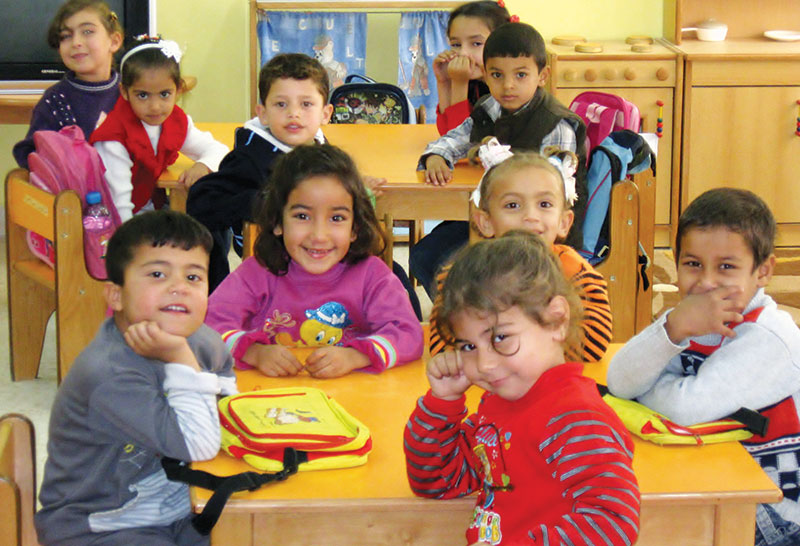[vc_row][vc_column width=”1/1″][vc_column_text]
Educating the Poorest Mothers and Children in Jordan
[/vc_column_text][/vc_column][/vc_row][vc_row][vc_column width=”2/3″][vc_column_text]
 By the time children enter first grade, they have mastered a few basic skills from kindergarten– at least colors, letters, counting, and maybe a nursery rhyme or two. Recently, I visited the Education Reform Support Program (ERSP), a pilot program initiated by USAID, in partnership with the Jordan Ministry of Education to provide early learning opportunities for children who are not able to attend kindergarten. Suddenly, I found myself reassessing my perception of four and five-year olds putting their supplies in their backpack like pros before the first day of first grade. Success from basic skills results from basic access.
By the time children enter first grade, they have mastered a few basic skills from kindergarten– at least colors, letters, counting, and maybe a nursery rhyme or two. Recently, I visited the Education Reform Support Program (ERSP), a pilot program initiated by USAID, in partnership with the Jordan Ministry of Education to provide early learning opportunities for children who are not able to attend kindergarten. Suddenly, I found myself reassessing my perception of four and five-year olds putting their supplies in their backpack like pros before the first day of first grade. Success from basic skills results from basic access.
The Jordanian Ministry of Education has served as a primary catalyst to the unprecedented success of the USAID-funded Education Support Program. About ten years ago, Jordan had not yet developed its public kindergarten system. Today, Jordan has established approximately 1,000 kindergarten classrooms with a uniform curriculum, thanks to the Ministry of Education and support from donors. The successes from this initiative have increased the demand for classrooms to double the current figure, encouraging stakeholders to continue increasing capacity.
Kindergartens are especially sparse in rural villages. In those remote areas, private kindergarten is not an option, and most kids do not have access to a pre-school education before beginning elementary school, foregoing its contribution to future success. A typical child profile for this program tends to come from a disadvantaged background (i.e. lower income, more isolated, less educated parents), further increasing the discrepancy between peers who have completed a kindergarten curriculum before entering first grade and those who have not. Consequently, they perform poorly on Jordan’s index of learning readiness across a range of domains: social and emotional skills, pre-literacy skills (i.e. ABCs), and classroom behavior among others.
Last winter, stakeholders from the Jordanian Ministry of Education and USAID launched the Education Reform Support Program to provide these children and their mothers with the tools to prepare for elementary school at home. For ten sessions, mothers and children are taught concurrently: Children engage in exercises targeted to develop kindergarten knowledge and skills; Mothers review concepts of child development, nutrition, and safety among others.
Approximately 450 children and 450 mothers from ten designated “poverty pockets” throughout the country have completed the program. When I visited two of the program sites, I could feel the enthusiasm from the moment I walked in the room. Mothers shared recipes for well-balanced meals with each other over the soft din of children singing, counting, and playing clapping games. The program empowers mothers to play an impactful role in their children’s academic foundation, reinforcing and advancing a child’s development from the curriculum.
Participants have expressed such positive feedback that in Spring 2013, the Jordanian Ministry of Education plans to expand the initiative to a nation-wide scale. This special partnership between local communities, USAID, and the Jordanian government personifies the sustainable successes we can achieve in development by working together.
Worldwide, a country’s long-term potential is embodied by its younger generations; an investment in youth education programs is by definition an investment in the country’s future. Through the commitment to the Education Reform Support Program, the Ministry of Education and its partners have demonstrated their commitment to all Jordanian youth, investing in an educational foundation that will provide the tools to define and build the country’s future. Kindergarten is the first step towards this future.
Katherine Merseth is the Deputy Chief of Party of the Jordan Education Reform Support Program (ERSP). ERSP is funded by USAID and implemented by Creative Associates International.[/vc_column_text][/vc_column][vc_column width=”1/12″][/vc_column][vc_column width=”1/4″][vc_widget_sidebar sidebar_id=”sidebar-primary”][/vc_column][/vc_row]